Introduction
A context of gradual economic reforms
In the late 1980s Syria started a process of gradual economic reforms aiming both at domestic liberalization to promote private initiative and increased integration into the international economy. As part of this process, public action in agriculture, characterized for many years by central planning and extensive Government intervention in price fixation and product commercialization, started evolving toward an increasing focus on economic incentives relative to prescriptions. This involved the recognition of a wider role for the private sector and the relaxation of the planning system with plan prescription progressively assuming an indicative status and the planning process becoming decentralized and participatory. In this new environment the need emerged of developing new technical and institutional capacities in agricultural policy making; to this effect the Syrian Government requested FAO technical assistance.
Technical support by FAO
The Italian Government provided generous financial support through FAO for the implementation of two projects: Project GCP/SYR/002/ITA (June 1995 - September 1996) focusing on the development of specific capacities through in-service training, Project GCP/SYR/006/ITA (April 1998 - on going) adopting an integrated approach to capacity and institutional development focused on the establishment and development of the National Agricultural Policy Center (NAPC).
Financial assistance by Italy
Project GCP/SYR/006/ITA has been implemented over three phases corresponding to successive stages of the capacity and institutional development process focused on the NAPC, as summarised in Box 1:
Box 1
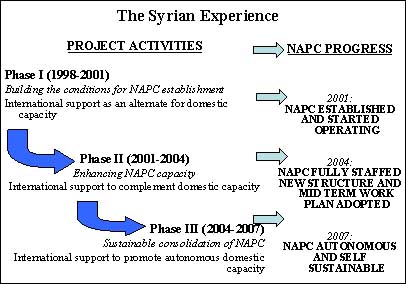
A gradual process towards sustainability
Phase I, Assistance in Institutional Strengthening and Agricultural Policy, covering the period April 1998 - October 2001, placed the foundations for the establishment of the National Agricultural Policy Center, while responding to the most urgent needs in agricultural policy analysis relying mainly on international expertise;
Phase II, Assistance for Capacity Building through Enhancing Operation of the NAPC, ranging between November 2001 and May 2004 is focusing on reinforcing the operational capacity of the NAPC by supporting the national capacity through the provision of international expertise;
Phase III (2004-2007) will provide international support to the sustainable consolidation of NAPC capacity to be a main player in addressing the agricultural policy analysis needs in the country.
Sound project architecture
Each phase of the Project was articulated in four components: Institutional Development, Agricultural Policy Analysis, Training and Statistical Information.
The institutional development component focused on providing options for enhancing the institutional capacity of the Ministry of Agriculture and Agrarian Reform (MAAR) in the field of agricultural policy and, more specifically, on developing NAPC capacity to perform its functions.
The agricultural policy analysis component supported the technical capacity to undertake comprehensive review and analysis of agricultural policies, strategies and programmes.
The training component established the cadre of policy analysts needed by the NAPC and other institutions, focusing on strengthening NAPC staff capacities to autonomously perform as policy analysts.
The statistical information component addressed the need to facilitate access to the data required for the economic analysis of agriculture.
Restructuring of organizations and establishing a new one
As a first step in Institutional Development, during Phase I, the Project prepared two studies with the support of international consultants, proposing options for reorganizing the structure of the Ministry of Agriculture and Agrarian Reform (MAAR) and providing the background to the establishment of a specialized institution in applied economic analysis of agricultural policies, the National Agricultural Policy Center (NAPC). A structure was devised for this new organization, as shown in Box 2.
Box 2 Proposed structure of the NAPC
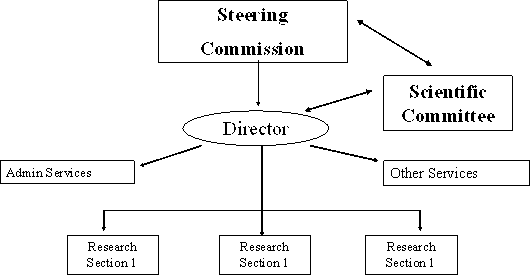
Analytical studies
...as background for the Agricultural Development Strategy of Syria
Likewise, Phase I of the Project targeted the emerging policy analysis needs through the production of fourteen studies carried out by international consultants in close collaboration with national experts with the objective of reviewing, increasing awareness and delivering advice on policy issues (Box 3). The studies were also used to develop national capacity through on-the-job training of national expertise and provided analytical background for the elaboration of an Agricultural Development Strategy for Syria. This document was produced through a process involving collaboration between international and national experts. The document provided a comprehensive reference framework and an analytical vision for agricultural policy making in the country
|
Box 3 Phase 1 - Policy Analysis Studies
These studies have been produced by a panel of high-level experts from a variety of countries, in collaboration with numerous Syrian experts from various Ministries and Universities. They have been assembled into an FAO publication entitled Syrian agriculture at the crossroads, (FAO, 2003, Agricultural Policy and Economic Development Series no. 8) |
Training
Training represented a major activity under the first two phases of the project (see Boxes 4 and 5). It was developed in three stages comprising basic, specialized and individually tailored phases, and was accompanied by complementary activities aiming at enriching trainees' background and their perception of the articulation of the agricultural economics and policy analysis field as well as at complementing training with hands-on participation in policy analysis activities promoted by the Project.
Agricultural Statistics
Another main objective of the Project has been facilitating access to available statistics for agricultural policy analysis. To this effect, the Syrian Agriculture Database, a collection of official statistics relevant for agricultural policy analysis previously not available in electronic format, was created and made available both on CD Rom and as a Policy Analysis Data Handbook.
Establishing the NAPC
In line with progress in project implementation, in the year 2000, the Syrian Government established NAPC as a central department of MAAR specialized in agricultural policy research[46] and, in 2001, it set up its structure, functions, job description[47], Scientific Committee and Steering Commission[48]. The Steering Committee is chaired by the Minister of Agricultural and Agrarian Reform and is composed of representatives of the MAAR and other institutions involved in Syrian agricultural policy making, such as the Ministry of Irrigation, Economy and Trade, Finance, and the State Planning Commission. As main governing body of the NAPC, the Steering Commission provides authoritative guidance to the NAPC approving its work plan, deciding upon financing and staffing and nominating the members of the Scientific Committee. The latter is composed of two international and two national experts from academic, research and government settings. The mandate of the Committee, which meets twice a year, is to provide scientific advice in defining and implementing activities in close exchange with NAPC Director and staff and by submitting recommendations for decisions to the Steering Commission. This institutional setting aims at adequately bridging research and policy by pursuing two interrelated objectives: guarantying an adequately scientific quality to the research activities and ensuring that they respond to the needs emerging from the on-going policy making process.
Box 4
|
Training |
||
|
Phase 1 |
Phase 2 |
Phase 3 |
|
Basic Training |
Specialized Training |
Tailored Training |
|
Complementary activities participation in project's activities (seminars, studies, field work) and ad hoc training sessions for filling emerging gaps |
||
staffing
... premises
The initial steps of the NAPC focused on establishing and strengthening its human resources: 13 of the best performing trainees were assigned to the Center to form the core of the research cadre in addition to 19 support staff. As for the premises, additional offices were renewed and equipped.
Box 5
|
Teaching delivered during Phase 1 |
|||
|
Hours |
Phase 1 |
Phase 2 |
Total |
|
Delivered by national experts |
650 |
417 |
1067 |
|
Delivered by international experts |
360 |
1100 |
1460 |
|
Total |
1010 |
1517 |
2527 |
|
Total per trainee |
337 |
759 |
1096 |
....developing institutional and management capacity
The Project Phase II started in late 2001 and its implementation has been closely coordinated with an FAO Technical Cooperation Project (TCP/SYR/2906), supporting the enhancement policy analysis capacities of the NAPC and its counterpart institutions. Phase II gives special emphasis to developing the institutional and managerial capacity of the NAPC by supporting
...communicat-ing its research work
In this Phase, the policy analysis component aimed at enabling NAPC to perform as a research center and forum for policy dialogue with the objective of promoting public awareness on policy issues by producing and disseminating a variety of publications and by establishing a Forum on agricultural policies through which findings are presented and discussed.
...becoming a forum for broad-based policy dialogue
Box 6
|
Policy Forum 2002 - 2003 · 2nd National Agricultural Policy Workshop · Strategic Options for Syrian Agricultural Policy (De Benedictis, Anania, and Shibani) · Organic Farming: European Markets and Opportunities for Syria (Santucci) · Economic Liberalization and Agriculture: a Critical Overview (Kydd) · WTO Negotiations on Agriculture: Implications for Developing Countries (El Amin) · Agricultural Globalisation in Developing Countries (Rao) · Agricultural Policies Changes in the EU (De Filippis) · Enhancing Export of Fruit and Vegetables to the EU Markets (Coque) · Food and Agriculture in a Globalizing World Economy (Gorgoni) · Arab Free Trade Area: Impact on Arab Economies (Al Abrash) |
.. producing periodical reports on Syrian agriculture and on trade
With regard to policy analysis work, the second phase of the Project focused on enabling the NAPC to carry out research activities and to disseminate the results. Along with the Syrian Agriculture Database, the NAPC produced two Periodical Reports: The State of Food and Agriculture in Syria 2002, expected to become a biennial publication, and Syrian Agricultural Trade 2002 and 2003, to be published every year. Thematic studies are being conducted on topics of special relevance for Syrian agricultural development, in addition to working papers and proceedings of seminars and workshops.
|
Box 7 NAPC outputs with Project support |
|
Periodical reports: · The State and Food and Agriculture in
Syria 2002 |
|
Thematic studies: · Promoting export of fruit and vegetables
to the EU |
|
Syrian agriculture database 2003 |
... building a Syrian Agriculture Database
Phase II of the Project gave a valuable contribution to the enhancement of the NAPC staff capacity to update the recently launched online Syrian Agriculture Database (SAD), and extend its coverage to include trade and census data. The usability of the SAD has been improved by introducing a new user-friendly electronic interface based on the FAOSTAT database. As a result, the 2003 issue of SAD is now available at the URL: http://faostat.fao.org:8090/caf/syrdb_default.htm. In order to reach these results, training on quantitative techniques and database management was delivered. Moreover, the establishment of a wider documentation system for the NAPC including an Intranet has been initiated.
Communication activities
Communication is a main issue at stake for an institution such as the NAPC, aiming at increasing public awareness on agricultural policies, promoting stakeholders involvement in decision making, and establishing and developing international links.
Therefore, the Center's publications (reports, working papers, training materials, biannual newsletter, and proceedings) are given extensive dissemination on paper, CD-ROM and Internet. Furthermore, the dynamic activities of the Agricultural Policy Forum promote public awareness on policy issues and dialogue with national and international stakeholders through the continuous organization of workshops designing analytical work on issues such as policy monitoring, comparative advantages and farming systems.
|
Box 8 NAPC activities: communication |
|
|
|
· Dissemination of outputs and information on activities: reports, working papers, training materials, biannual newsletter and proceedings, disseminated on paper, CD-ROM, Internet, and through E-mail. |
|
· Establish and develop international links: International dissemination of analytical work, participation in international activities and events and stages in foreign institutions |
|
· Workshops to involve stakeholders in designing analytical work |
|
· Policy forum to promote public awareness on policy issued and dialogue with stakeholders on analytical outputs |
Bridging research and policy
Equally important is the establishment and development of NAPC's links with policy makers in order to ensure responsiveness of the Center's work to the actual need of the country as well as the effective involvement of NAPC skills in policy formulation and trade negotiation. In order to enable continuous exchange of information, a formal institutional link with policy makers is guaranteed by the Steering Commission, which defines and monitors NAPC activities. A continuous flow of information is granted through permanent consultations with policy makers and participation in front-line policy work. Moreover, policy briefs and notes are prepared and "ad hoc" dissemination of outputs takes place in response to policy makers' requests and needs, as summarised in Box 9 below.
|
Box 9 NAPC links with policy makers |
|
· Institutional link in defining and monitoring NAPC activities through the Steering Commission |
|
· Focus on policy implications of analytical studies |
|
· Continuous exchange through networks with policy makers |
|
· "Ad hoc" dissemination of outputs through policy briefs and notes also in response to requests of the policy makers |
|
· Participation in policy formulation and trade negotiation, e.g., association with the EU, bilateral trade agreements, formulation of agricultural strategy and other specific policies |
Training
Phase II of the Project also made a substantial investment in training as can be seen from Boxes 10 and 11. In addition to the training of new cadres organized on the same line of the programme delivered during the previous phase of the Project, substantial investment was made in enhancing NAPC staff capacities. The latter included post graduate training in the USA for 4 staff members, short stages abroad for all other staff members, internal (staff-to-staff) seminars, one-week courses, seminars, language training, flash courses, research and training assistantships, on-the-job training.
Box 10
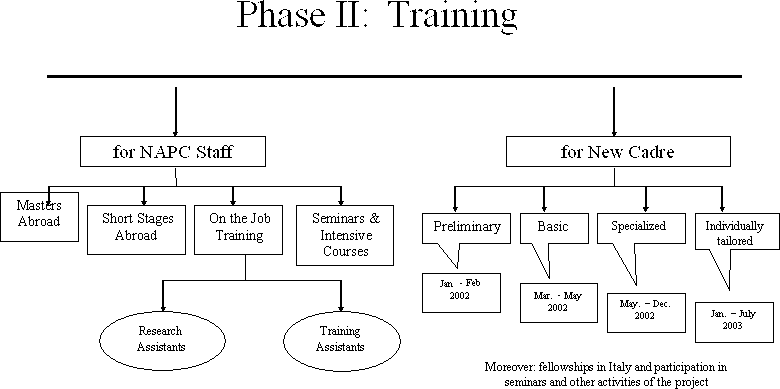
Box 11
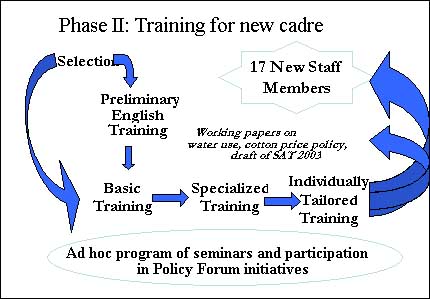
Completion of the second training programme allowed a substantial increase in NAPC staffing. Indeed, the limited number of qualified staff available undermined NAPC capacity to deliver, making it highly dependent on Project support, especially considering that most qualified staff members were still abroad for post graduate training.
Consolidating the NAPC
At the end of the second phase of the Project, the "nursing phase" of NAPC development can be considered completed. Indeed, staffing has reached the planned level, as can be seen from Box 12 while a Mid Term Work Plan for the period 2004-2007 has been adopted together with a new organizational structure designed thanks to the institutional support provided by the Project based on the experience gained during the previous years. The new organization will be adopted on experimental basis in the second part of 2004, when the staff currently abroad will be able to assume their duties in the NAPC
Box 12
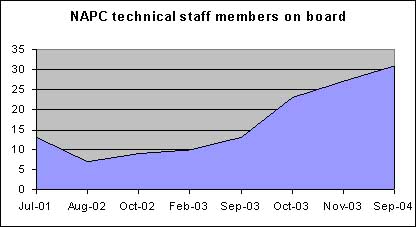
A new structure for the NAPC
Box 13
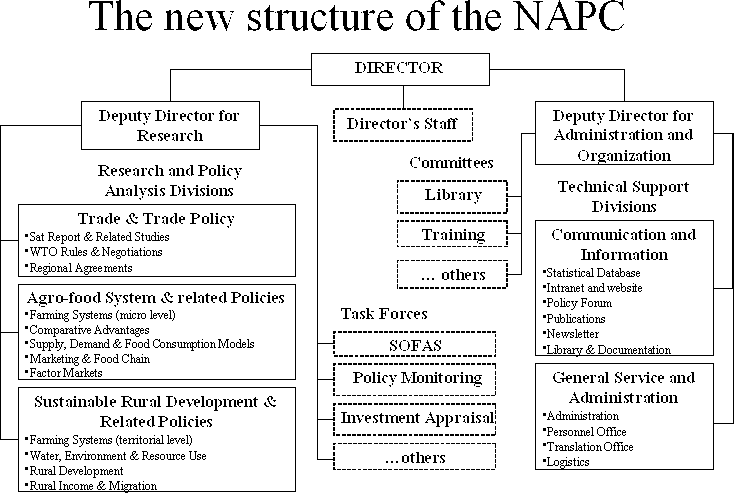
A new phase for consolidation and sustainability
In order to support the implementation of the new mid term Work Plan, upon request by the Syrian Government through FAO, the Italian Government granted a three year extension of the Project. The extended support will focus on the sustainable consolidation of NAPC over the period 2004 - 2007 when the staffing will be completed, offices will be transferred to the new premises currently being built specifically for the NAPC and the new organizational structure implemented. Hence, NAPC will be enabled to autonomously contribute to the policy process by analyzing, formulating and monitoring policies, providing advice to policy makers and promoting dialogue among stakeholders.
Elements towards sustainability
In order to set up the NAPC as a self sustaining institution in line with international standards, the following activities and measures are envisaged:
During the consolidation phase, aiming at strengthening NAPC capacity to perform autonomously, the Project will
Moreover, human resources capacities will be enhanced and consolidated though the provision of overseas post graduate training for staff members, internships and participation in international events and intensive one week in-service courses.
Availability and accessibility of information for policy analysis will be enhanced by updating and enhancing the Syrian Agriculture Database, establishing an integrated information system by developing a documentation system, supporting the enhancement of the NAPC Intranet and web site, and consolidating the library.
Conclusions
In conclusion, the Syrian experience offers a wide set of examples of possible interventions in capacity development for policy analysis, and, more specifically, a possible model for institution building in contexts where national capacity is limited and a specialized institution is not yet in place.
Overall, it provides an example of synergic interaction between domestic and international resources, where a long and substantial presence of international expertise complements and contributes to enhancing domestic expertise avoiding crowding out national efforts. Indeed, progress made from Phase I to Phase II of the Project shows that international support, after acting for a few years (1998-2001) as an alternate for the domestic capacity being developed, started to become a complement to it (2001-2004), able then, during Phase III (2004-2007), to concentrate on promoting the autonomy of domestic capacity and, thus, the self-sustainability of the National Agricultural Policy Center in pursuing its long term mission (Box 14).
|
Box 14 The NAPC beyond the Project |
|
The long term mission of the NAPC |
|
1. Autonomously produce and disseminate research results |
|
Requirements for self-sustainability |
|
· Good quality technical staff (motivation, incentives, training and experience) · Consolidated institutional setting · A degree of independence and financial autonomy · Strong links with policy makers · International networking and exposure · Networking with Syrian stakeholders and scientific community |
|
[44] Assistance for Capacity
building through enhancing operation of the National Agricultural Policy
Center. [45] Director, NAPC and Project Chief Technical Adviser, respectively. [46] Decision no. 51/T of Dec. 14, 2000 [47] Decision no. 48 of Aug. 9, 2001 [48] Decision no. 1260 of Aug. 9, 2001. |